Iced Holly
December 28, 2005
11:21 AM
This morning there was a frost and Sile found that the water on the top of the bucket where we had been storing the holly for Christmas had frozen, beautifully capturing in ice the berries and leaves which had fallen off and were floating on top of the water.
Pretty Cool Eh?
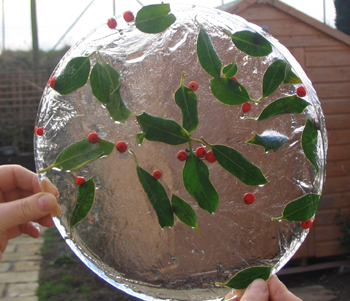
Walking the Minaun
December 27, 2005
00:07 AM
Since the children were little one of our favourite walks has been up the Minaun.
This is a pleasant , stiff but not too strenuous, walk over the hill which is just at the point of the meeting of the Suir and the Noire at the borders of Waterford,Kilkenny and Wexford.
On this St. Stephens Day, for want of Wran Boys, we tried it again .
As this walk is a 25 year old family tradition it involves certain formulae.
At the barrier at the start of the walk the children always hang like “roast sucking pigs”.
Deirdre could still hang there.
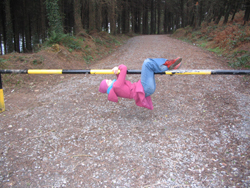
Eileen flopped
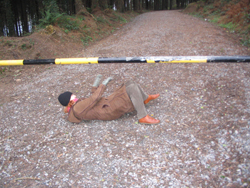
Sile just got it wrong.
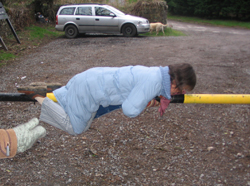
There have been a lot of changes in the woods here over the last few years.
There are now places where one can see right across to the new Port of Waterford where previously one was in the midst of dense undergrowth.
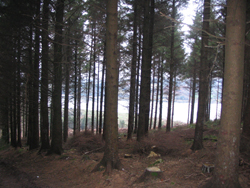
But also there are places where the rhodendrons have got so dense that one is breaking ones way through narrow low tunnels.
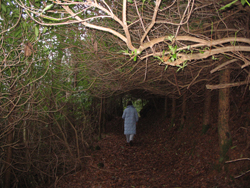
However the watchtower is still an impressive mid way point.
And a good chance for a photo opportunity.
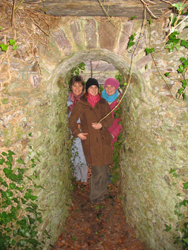
The end of the walk involves us in a backbreaking climb back to the Car.
Fortunately it has a half way bench for welcome chance to breathe.
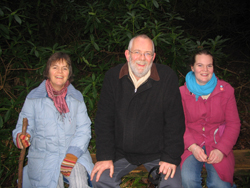
Back at the car Eileen tried again to be a roast sucking pig and , this time, she succeeded!
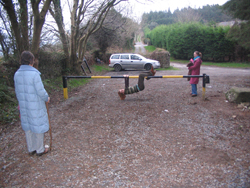
Shortly afterwards Caitriona and Aonghus arrived and we demolished the second half of the Turkey.( I still think the reheated bird and trimmings taste better on the day after)
Christmas Tree
December 24, 2005
06:37 AM
This is our first Christmas in Griffith Place and we decided to buy a live tree in a pot because we now have a garden to keep it in.
The people who sold it to us told us that we should acclimatise it gradually to coming in and out of the central heating if we wanted it to live afterwards.
Our other problem was where to put it.
Our new house is small.
We sat it just outside the kitchen door while we made up our minds where to put it.
Finally we killed two birds with the one stone and left it just there.
As the kitchen door is clear glass it can be seen inside anyway, the only thing we miss is the pine smell.
Decorating was no problem as I had loads of glass bits and pieces, gathered over the years,which can easily be left outside, so far the wind has only smashed one of the balls off.
A good hard frost could make it look quite magical.
Here it is at night, reflected on the open back door.
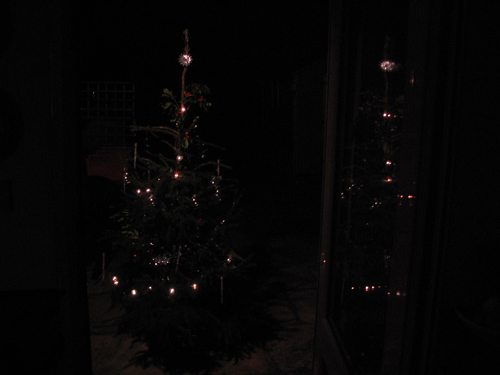
Happy Christmas !
2 comments
Ruby Glass
December 23, 2005
20:32 PM
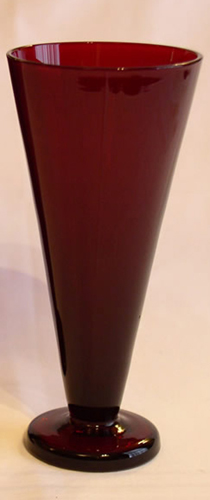
Sile and I found this unusual Victorian ruby glass vase in Cahir a couple of years ago.
The colour is a perfect christmas red.
Dwyers of Cork 1
December 21, 2005
12:15 PM
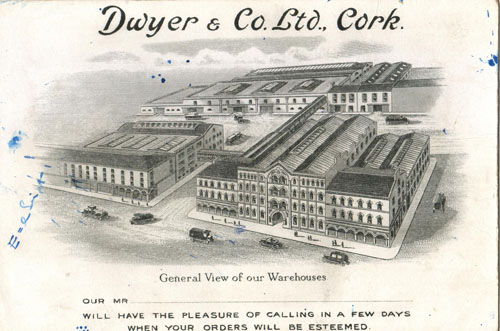
My friend Tom Power was going through books in his attic when he found this card.
It is a travellers calling card/blotter from I would guess the 1920s.
It couldn’t have come at a more apposite time.
My brothers and sisters and I are just beginning to get a history of our family in Cork together.
This was all started by my blog piece Another Wedding which has fascinated us all.
But this picture gives me some idea of than size and immensity of Dwyer and Company.
All the buildings are still standing on Washington Street in Cork, directly across the street from the courthouse.
I have such strong memories of being taken in those covered in bridges to visit the various departments and factories connected to the main building.
There must have been over a thousand people employed there in its prime, between the wholesale warehouse, knitwear factory, shirt factory, suit factory, tea blending and goodness knows what else.
As I said we are attempting to get a history together, more for our children and grandchildren than for the best seller lists.
It is a long shot I know but if anyone out there thinks they have any information which we could use do contact me.
There must be thousands of small shops in the country which depended on Dwyers for its supplies.
I have very deliberately called this piece Dwyers of Cork 1.
There will be more!
Up all Night
December 20, 2005
05:13 AM
BBC Radio Five , on their Up All Night programme do a piece they call Pods and Blogs in which they interview , Yes! Podders and Bloggers.
Last night they had a special on food for Christmas so they had three experts on to talk about these,Podders,Anne Bramley of Eat Feed and Jay of Grape Radio talking about wine and blogger Martin Dwyer talking about food.
You have no idea what illustrious company you are keeping!
It was great fun to feel that for once I was talking to a bigger world than Waterford.
You can listen to it for about a week if you click on to Radio Five Live and follow the leads to Rhod Sharp’s “Up all Night”.
I think I managed to keep the end up for Ireland!
PS on Weds 21st Dec
If you are brave enough to listen I have found that even Auntie nods
and Monday nights Up All Night is filed under Tuesday and that yes
this pompous Irishman is available there.
PPS.
I hereby award myself a large Simsonic DOH!
Of course the programme was filed under Tuesday.
It was actually early Tuesday it was aired.
Apologies to Auntie, who didn’t nod at all!
Jon Buckley’s Mistake
December 19, 2005
17:47 PM
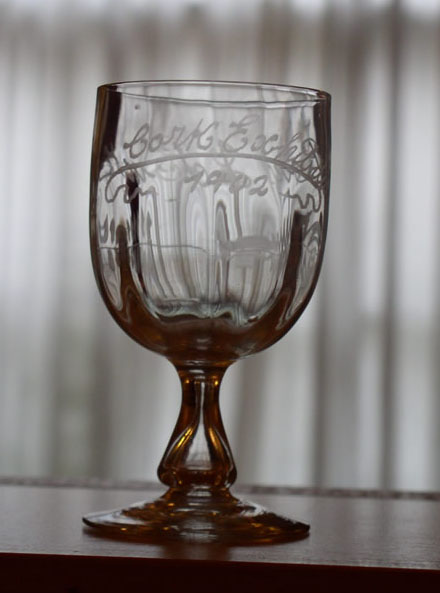
About four years ago Sile and I were in Cork and I noticed a glass in the window of an antique shop in Fenns Quay.
On one side was engraved the name
Rev. J Buckley
on the other
Cork Exhibition 1902
I was keen to buy it but it turned out to be above my limit.
The next time in Cork I decided to take the plunge anyway but found it gone, obviously sold.
I discovered on my next birthday that Sile instructed Deirdre, then a student in Cork, to try and get it for me and she found that it hadn’t been sold merely brought home by the antiquarian for his own mantlepiece.
He was persuaded to sell it, and I had a surprise birthday present .
I was inspired to fiction by it and wrote a very short story called
“Jon Buckley’s Mistake”
This was heavily derived from a verse in a great folk song of Cork
“The Bould Thady Quill ”
which my brother-in-law Milo Lynch has been known to sing from time to time.
Here is the relevant verse, (and the chorus):
At the Cork exhibition there was a young lady,
Whose fortune exceeded a million or more,
But a poor constitution had ruined her completely,
And medical treatment had failed o’er and o’er,
“Oh Doctor”, said she, “I know what tis ails me
And will cure this disease that is threatening to kill
Give over your doctors, your medical treatment,
I’d rather one squeeze from the Bold Thady Quill.”
For ramblin’, for rovin’, for football or courtin’,
For drinkin’ black porter as fast as you’d fill,
In all your days rovin, you’d find none so jovial,
As the Muskerry sportsman the Bould Thady Quill.
And here is the piece of fiction:
Jon Buckley’s Mistake
Jon Buckley was always careful to spell his christian name without the h. It showed his distance from the common or garden John.
Not that this distance was of any great importance to anybody other than Jon.
It wasn’t as if the Buckleys had any claims to grandeur, the appearance of money maybe, but even that from trade, from the shop his Father ran in North Main Street. It was however a very respectable drapery shop, frequented even by Protestents for his Mothers fine eye for silks and muslins. She it was who had christened him Jonathan and she it was who had her heart set on him going to Maynooth and becoming a priest.
This was his dilemma at the moment as he made his way down the Mardyke to the showgrounds of Corks great Exhibition.
There was a lot to be said for the priesthood, the respectful glances from his peers,the satisfaction of a sermon well delivered to a captive audience and even the hope of a spiritual reward at the end of life. But then there was the ladies.
Jon had done enough time in the shop to be aware of the great looks of the young fashionable ladies from Sundays Well and Montenotte who came to buy materials from his Mother. His eye had particularly been caught by the interesting pale looks of young Miss Daly who’s father was a wealthy tea merchant with a warehouse on the quay,M.D. Daly and Sons .
Miss Daly (or Mary as he heard her Mother call her in the shop) was indeed a beauty, her glossy brown hair and velvet brown eyes set off by a very pale complexion, (she was said to be delicate and her adoring father Maurice had brought her to many doctors and even as far as Baden searching for a cure.) Miss Daly was also known to be quite an heiress, set to inherit a million or more it was rumoured.
Miss Daly was very much on Jon’s mind as he browsed through the huge displays of every modern machine in the stalls in the exhibition building and as he climbed to the top of the enormous slide by the river.
It was while he was on the top of this that he caught a glimpse of her.
All in brown velvet to match her eyes (Jon remembered her Mother buying the stuff in their shop) she looked her most pale and interesting best. She was looking with some pleasure at the glass engraver who was etching peoples name on glasses on a little stand by the main building. Then Jon got his great idea. He would get a glass engraved with her name and present it to her.This would surely impress her.
He slid down the slide at breakneck speed and ran to the stand.
“Please just put down Miss Mary Daly” he said.
“Would you like some decoration ”
“A Heart” said Jon, suddenly inspired.
Clutching his prize Jon chased after Miss Daly.
He glimpsed her in the distance, then got nearer and his heart stopped in his chest. She was strolling now arm in arm with a young man. Even from this distance Jon could recognise him as young Thaddeus Quill, the hurler.
Saddened but admitting defeat from such a rival Jon made his way to the river and on impulse hurled the now useless glass into the middle of the stream.
But then he thought that seeing Thaddeus with Miss Daly had made his mind up for him,without Miss Daly the road to Maynooth was clear.
He made his way again to the glass engraver.
“I want you to do another for me ” he said
“This time put Rev J Buckley on it, but no heart ”
Five Books of Separation
December 12, 2005
11:17 AM
For many years now on our annual and sometimes twice annual trips to France we have chosen to travel by car.
Not only to travel by car but, instead of taking a direct ferry to France from Ireland, to take the ferry from Rosslare to Wales, then drive across England before taking the ferry from one of the many ferry ports to France.
Initially, and while the children were travelling with us, and indeed before the days of cheap flights, this was done because it was the cheapest way of getting to our goal.
Nowadays, being creatures of habit, we often follow the same route
And, with the current problems in Irish Ferries, we may well be doing it again in the future.
As a traveller I am always terrified of missing my connection and always want to be within spitting distance of the ferry port before I like to stop.
Quite close to the Welsh ferry ports of Pembroke and Fishguard, inevitably our goals on our return journey, is the village of Laugharne.
As well as its proximity to the Welsh ferry ports,there are several good reasons to stop in Laugharne.
It is a very pretty Welsh seaside village.
It houses Dylan Thomas house, now a museum, which is beautifully sited on the estuary, and, on the path above, the shed where he used to write his books.
In fact Laugharne is the model for Llareggub, where he set “Under Milk Wood”.
We all know what Llareggub spells backwards.
The other excellent reason for stopping off in Laugharne is that it houses Corrans bookstore.
This is the largest and most intelligently catalogued second hand bookshop I know and always yields jewels.
(For one thing it always has shelves full of Dornford Yates novels.)
It was here a few years ago that I picked up a book which I find constantly charming, and which I keep by my bed as something to dip into whenever I want to sip rather than quaff.
It is “Christmas Crackers” by John Julius Norwich.
This, although published in 1980, is still available in Amazon, and, while researching for this piece I have discovered that he has since put together two more Crackers, viz; More Christmas Crackers and Still More Christmas Crackers both of which are now down on my wish list.
He tells the story in the introduction to my volume of how these compendiums started.
Apparently his mother sent him a blank leather bound volume as a present in the fifties and, lacking any other use for it, he decided to turn it into a commonplace books where he would write down anything he read or otherwise came across which tickled his fancy.
I will give you just two tiny excerpts;
The late Sir Compton Mackenzie, invited to name the ten most beautiful words in the English Language picked twenty:
Carnation, azure, peril, moon , forlorn,
Heart, silence, shadow, April, Apricot.
A good selection which I prefer to his second team:
Damask and damson, doom and harlequin and fire,
Autumn, vanity, flame, nectarine, desire.
And this one from Dorothy Parker:
Oh, life is a glorious cycle of song,
A medley of extemporanea;
And love is a thing that can never go wrong,
And I am Marie of Roumania.
It is indeed a wonderful book to dip into to.
But to get back to the title of this piece.
John Julius Norwich (who also wrote a most enjoyable book about Venice: Paradise of Cities, Venice and its Nineteenth Century Visitors)
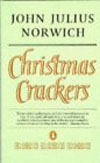
was the father of Artemis Cooper who has written the best biography of my heroine, Elizabeth David; Writing at the Kitchen Table
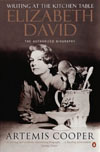
She is married to Anthony Beevor who has written the excellent modern histories of Berlin and Stalingrad.
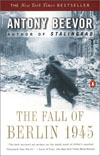
He is the son of Kinta Beevor who has written that wonderful story of growing up in Italy in the early 20th century: A Tuscan Childhood
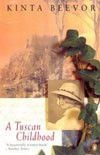
She is in turn the Aunt of Michael Waterfield, Editor of his great Aunt,Janet Ross’s classic cookbook “Leaves from a Tuscan Kitchen”

And he is the chef for whom I worked for many years in the village of Wye in Kent and my daughter Caitriona’s godfather.
There you have it
You have heard of six degrees of separation.
There are just five (ok six if you count both of Anthony Beevor’s) books of separation between myself and Christmas Crackers.
A good omen for the season.
A Cork Christmas in the Fifties
December 11, 2005
08:27 AM
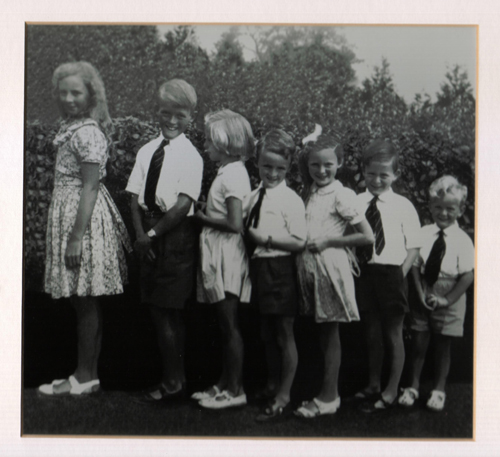
My brothers and sisters and I in the early fifties
Deirdre George Valerie David Fifi Teddy and Martin
We always went to Lotaville for lunch on Christmas day.
Lotaville was my fathers family home, a stately Victorian Villa in Glanmire, overlooking the river Lee about 3 miles outside Cork city.
It was what they call a “Gentleman’s Residence”, in about two or three acres of gardens, including a disused tennis court and large greenhouses where we were allowed pick the delicious black grapes in September.
The house itself was quite large but without a lot of bedrooms, probably about four or five , but these were huge.
It also had a tower built in on one side, a piece of Victorian/Gothic whimsy which could only be scaled inside by a series of ladders, and which the boys were allowed climb after lunch on Christmas day.
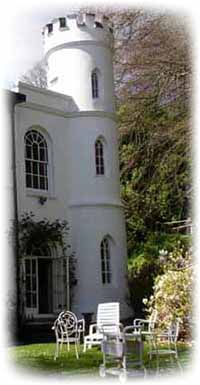
The tower at Lotaville
The inhabitants of the house were an odd lot to my young eyes too.
The head of the house (we would always have described a trip there as going to Granny Dwyers) was my Granny.
She was small and round and, as far as I was concerned, permanently cross.
My elder sister remembers someone quite different, someone warm who spoiled her, but, by the time I got to know her life had squeezed most of the joy from her, and, as the seventh child, the best emotion I could expect from her was tolerance.
My grandfather we called Dubs, he and Granny lived totally different lives within this house. Their marriage was endured not enjoyed, it was a type of early Irish divorce.
As well as having his own bedroom, Dubs had his own drawing room, a large brown masculine room with large windows overlooking the river.
This he shared with various small dogs of whom he was very fond.
He was also fond of his grandchildren and I remember always feeling welcome when I entered his room.
Granny’s Drawing room was at the end of the corridor but also looked over the river. In contrast with Dubs room it was feminine and chintzy with carpet and curtains in pale greens and pinks.
Granny shared this room with two other members of the household. Auntie Gill and Auntie Kat.
Auntie Gill was my father’s only sibling and 18 years his junior.
She was at this stage in her mid twenties, unmarried and, even to my eyes strangely old fashioned. I would also have rated her as cross and could see that she was interested only in the older children.
Auntie Kat on the other hand was kindness itself, it was obvious that like the younger children she was tolerated rather than loved and as such there was an unspoken bond between us.
She was a classic maiden Aunt, my Granny’s unmarried sister and she was shared between Granny’s household and that of her younger sister in a farm in Mitchelstown. It was always obvious to me, from the way she used to talk about the farm and the family there, that that was her favoured billet and she enjoyed her stays in Lotaville as little as Granny and Auntie Gill did.
Auntie Kat smoked “like a chimney”, she always had a Woodbine in the corner of her mouth and her cloud of white hair had permanent brown nicotine stain in that place where the smoke ascended.
The other member of the household, and to me much the most interesting was Lena.
Lena was the cook and her kingdom was in the large, dark basement kitchen.
Lena was an old retainer and as I remember her quite lame, she got about with some difficulty using a stick.
This did not stop her doing all the cooking and ruling over the girls who had been brought in for serving on Christmas day with an iron hand.
She was a kindly lady though and would tolerate us children “under her feet” for short periods.
These visits to the kitchen would have to be organised with some skill as it was strictly forbidden to go “annoying Lena” before lunch on Christmas day.
Despite all embargos I can still remember being put by her up on a chair in the kitchen to better see her making the bread sauce for the turkey.
I still have a memory of the delicious smell of the milk infusing with an onion studded with cloves, as Lena grated stale bread with which to thicken the sauce.
The lunch itself was not my favourite part of the day.
For all Lena’s kindness the food was much better at home.
The younger children were put at a small side table and, under orders to behave well, fed apart from the adults.
I can remember a certain amount of jollity at the large table, I can remember the surprise I felt when granny allowed a paper hat from a cracker to be put on her head.
I presume that Dubs would also have broken out of his part of the house and joined us for lunch, even though I have no memory of him being there.
I would hate anyone to think that Christmas day was not a happy day for me.
It was in fact a day full of magic, the lunch in Granny’s being just a formal and perfectly acceptable hiatus in the middle of a joyous day.
Santa Claus, and his stocking were a great source of joy when my eyes first opened on Christmas morning.
I would have lain for hours in the bed, too excited to sleep and knowing that “He” wouldn’t come until I did.
The morning stocking was always filled with cheap toys and sweets and always had a silver wrapped tangerine at the toe.
Unlike other households Santa didn’t provide the main Christmas presents for us.
This was reserved for the “Christmas Tree”
“The Tree” as we called this time was, without doubt the highlight of Christmas day.
After morning mass, for those who were reckoned too young to be allowed up for midnight mass, we had breakfast in the breakfast room which was next to the billiard room.
The billiard room was the biggest room in the house, large enough for a billiard table but as yet not holding one.
There was no decorating done to this room until after the younger children had gone to bed on Christmas eve.
Then it was transformed.
There was a large amount of ceremony attached to “The Tree”
We all had to line up in age at the door to the billiard room.
This was the one time of the year when the youngest took precedence.
Then once we got into the room itself we had to join hands and dance around the tree singing “Here we go round the mulberry bush”
This does sound just a little twee in 2005 but I promise you that in the fifties there was no embarrassment whatsoever.
The tree was put in the middle of the room, decorated with lights and the shiny glass balls which rested for the rest of the year in the attic in boxes.
But it was what was under the tree was what made the magic of this moment.
Here were piled all our presents.
This was what “The Tree” was all about.
Again tradition dictated that you were not allowed pick or open one of your own presents. Anything with “To Martin” on it, no matter how tempting, had to be passed by and one picked out one for George or Valerie.
Eventually you ended up with a sizeable pile of presents in the corner and then there was the excitement of unwrapping and glorying in your new found wealth.
I never remember being disappointed.
Then it was off to Granny’s for lunch.
When we came back from Granny’s we would find the Billiard room again completely transformed this time for Christmas Dinner.
The tree would be re-erected in the bow window in the corner and the floor covered with trestle tables covered with white linen.
To my childish eyes it seemed that these tables were set for hundreds of people but I now suppose that it couldn’t have been more than forty or so.
These would have been members of my mothers large family, and my mother and fathers equally large circle of friends.
There would be various extra staff recruited for the night so, for us children it was difficult to decide where the most fun was going on, in the billiard room or in the kitchen.
In direct contrast to the staid and old fashioned lunch the dinner was a bit of a bacchanalia.
I can remember that we were allowed smoke, yes us 8 to 10 year olds were allowed to puff away!
I can also remember that much drink was consumed by my various uncles.
I have a distinct memory of someone’s paper hat being ignited and then the flames quenched by another uncle with a soda water siphon.
In the meantime there would have also been much hilarity and drink consumed in the kitchen, I can remember a steady stream of uncles and aunts arriving in with bottles to make sure that the “staff” were able to celebrate as well.
Stephens day was “The Wran” and we would be allowed dress up in rags and sing outside our neighbours houses, passing others up to the same tricks on the way.
“The Wran the Wran
The king of all Birds
St Stephens day
Was caught in the furze
Up with the kettle
And down with the pot
Give us our answer and let us begone”
“Knock at the knocker ring at the bell,
Give us a copper for singing so well”
“God bless the mistress of this house
A golden chain around her neck
And be she sick or be she sore
The lord have mercy all the more”
And we would be given lots of coppers and this money, unlike the money we would have collected for carol singing the week before, was for ourselves and so, once we were finished we would divide the spoils and head off to Mr. Sullivan’s shop on the Lower Road for a gorge of sweets.
As you can see it was easy enough to put up with lunch in Lotaville knowing what other treats Christmas had in store for us.
4 comments
Le Verre
December 10, 2005
22:37 PM
|
